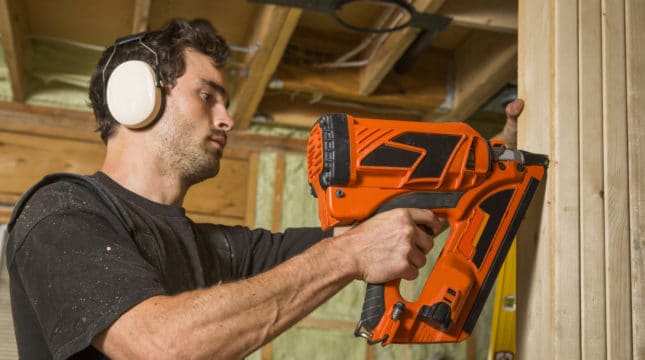Minnesota
License required: Yes
Licensing authority: Minnesota Department of Labor and Industry (DLI)
In Minnesota, carpentry is classified as a special skill area within the Residential Building Contractor category. These include rough and finish carpentry, decks, doors, windows, wood foundations and drywall installation. You don’t need a license if you earn less than $15,000 per year and provide only one specialty skill.
However, if you perform more than one specialty skill or earn above that threshold, you must obtain a Residential Remodeler License (for existing structures) or a Residential Building Contractor License (for new construction).
Applicants must provide proof of general liability insurance and workers’ compensation coverage, pass an exam and register their business with DLI.
Required business insurance in Minnesota:
Mississippi
License required: Yes
Licensing authority: Mississippi State Board of Contractors (MSBOC)
Carpenters in Mississippi who perform remodeling or repair work on existing structures valued at more than $10,000 must hold a Residential Remodeling License from the MSBOC. This license covers carpentry and other improvement work on residential properties.
Applicants must pass both a trade exam and a business and law exam, provide proof of general liability insurance and meet all financial and registration requirements.
Required business insurance in Mississippi:
Missouri
License required: No (state-level license)
Licensing authority: Local municipalities
Missouri does not require a statewide carpenter or contractor license. However, local governments — including Kansas City, St. Louis and Springfield — have their own contractor licensing or registration requirements, which may include proof of insurance or bonding. Always check with your city or county before starting a project.
Required business insurance in Missouri:
- Workers’ compensation insurance is required for businesses with five or more employees, or for any construction business with one or more employees.
- General liability insurance is not required by the state but is strongly recommended and often required at the local level to help protect against property damage or injury claims.
Montana
License required: No (state-level carpenter license)
Licensing authority: Montana Department of Labor and Industry (DLI) – Contractor Registration Unit
Carpenters in Montana are classified as construction contractors, which includes anyone who adds to or alters a structure or improvement attached to real estate. While a specific carpenter license isn’t required, contractors who have employees must register with the Department of Labor and Industry. Independent contractors without employees can obtain an Independent Contractor Exemption Certificate (ICEC).
Required business insurance in Montana:
Nebraska
License required: No (state-level carpenter license)
Licensing authority: Nebraska Department of Labor – Contractor Registration Division
Carpenters in Nebraska do not need a state-issued license to perform work. However, anyone engaged in construction, alteration, renovation, addition, repair or installation work — including subcontractors — must register as a contractor with the Nebraska Department of Labor before starting projects. Registration helps ensure compliance with workers’ compensation and unemployment insurance laws.
Required business insurance in Nebraska:
- Workers’ compensation insurance is required for businesses with one or more employees.
- General liability insurance is not required by the state for registration, but it’s recommended and may be required by clients or local jurisdictions to help protect against third-party property damage or injuries.
Nevada
License required: Yes
Licensing authority: Nevada State Contractors Board (NSCB)
Carpenters in Nevada must hold a C-3 Specialty Contractor License to perform carpentry, maintenance and minor repairs. The C-3 classification includes several subcategories such as:
- C-3a (Carpentry and Repairs)
- C-3b (Finish Carpentry)
- C-3c (Insulation and Weather Stripping)
- C-3d (Overhead Doors)
- C-3e (Drywall)
A state license is required for any project valued at $1,000 or more, including labor and materials.
Applicants must demonstrate four years of experience (with up to three years of college education accepted as equivalent), pass both the trade and business and law exams, provide proof of a surety bond and workers’ compensation coverage.
Required business insurance in Nevada:
- Workers’ compensation insurance is required for businesses with one or more employees.
- General liability insurance is not required by the state but is strongly recommended and may be required by clients or local building authorities to help protect against property damage or injury claims.
New Hampshire
License required: No (state-level carpenter license)
Licensing authority: Local municipalities
New Hampshire does not require a state-issued license for carpenters or general contractors. However, local governments may have their own permitting or registration requirements for building and remodeling work, so it’s important to verify city or county rules before beginning a project.
Required business insurance in New Hampshire:
New Jersey
License required: No (state-level license)
Licensing authority: New Jersey Division of Consumer Affairs – Regulated Business Section
Carpenters in New Jersey are classified as home improvement contractors, covering work such as remodeling, repairing, renovating, painting or modernizing residential structures.
While no state license is required, all home improvement contractors must register with the New Jersey Division of Consumer Affairs before performing work. Some municipalities may also require local licenses or permits.
Effective March 31, 2025, all New Jersey home improvement contractors must meet new registration and renewal requirements. These include carrying general liability insurance with at least $500,000 in coverage and maintaining a surety bond or other security ranging from $10,000 to $50,000, based on project size.
Required business insurance in New Jersey:
New Mexico
License required: Yes
Licensing authority: New Mexico Regulation and Licensing Department – Construction Industries Division (CID)
Carpenters in New Mexico must hold a state contractor license under one of two primary classifications: GB-2 Residential Contractor or GB-98 General Building Contractor.
Applicants must define the scope of their work and industry when applying, and specify whether they’ll act as a prime contractor. Depending on the classification, applicants need two to four years of verified experience, must pass both the trade exam and business and law exam and meet CID’s financial and bonding requirements.
Required business insurance in New Mexico:
- Workers’ compensation insurance is required for businesses with three or more employees.
- General liability insurance is not mandated by the state but is recommended and may be required by local jurisdictions or for commercial projects to help protect against property damage or injury claims.
New York
License required: No (state-level carpenter license)
Licensing authority: Local municipalities
New York does not require a statewide carpenter license. However, licensing and registration are managed locally — for example, New York City, Buffalo and Rochester each have their own contractor licensing or permit requirements. Always verify local carpenter license rules and insurance requirements before starting work.
Required business insurance in New York:
- Workers’ compensation insurance is required for businesses with one or more employees.
- General liability insurance is not required at the state level but is mandatory in many cities, including New York City, to register as a contractor. It helps protect against third-party injury or property damage claims.
North Carolina
License required: Yes
Licensing authority: North Carolina Licensing Board for General Contractors (NCLBGC)
Carpenters in North Carolina must hold a state contractor license if the total project value is $40,000 or more (up from $30,000 effective October 2024).
Depending on the scope of work, carpenters may be classified as Residential Contractors (for home construction and remodeling) or Specialty Contractors, which include trades such as interior carpentry, flooring, finishing, window and door installation and cabinetry.
Applicants must meet the minimum financial requirements set by the NCLBGC and pass a license exam for their classification.
Required business insurance in North Carolina:
North Dakota
License required: Yes
Licensing authority: North Dakota Secretary of State – Contractor Licensing Division
Carpenters in North Dakota are classified as contractors and must hold a state contractor license for any project valued at more than $4,000, including labor and materials. Licenses are issued based on the scope and value of the work performed.
Applicants must register their business with the Secretary of State, provide proof of workers’ compensation and general liability insurance and maintain an active business license.
Required business insurance in North Dakota:









